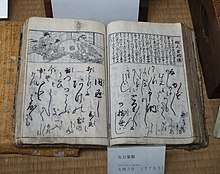Onna Daigaku
The Onna Daigaku (女大学 or "The Great Learning for Women") is an 18th-century Japanese educational text advocating for neo-Confucian values in education, with the oldest existing version dating to 1729. It is frequently attributed to Japanese botanist and educator Kaibara Ekken.

Education of women
The Onna Daigaku is cited as Ekken's most popular book, which was often gifted to new brides due to its accessible tone and a lack of general instructional materials for new families.[1]
It teaches the moral need for total subordination of women to the needs to the husband and family.[2] The book suggests that women are too stupid to trust themselves and must "distrust herself and obey her husband".[2] Scholars point to the wide circulation of the text as reflective of Edo-period misogyny.[3] It was roundly criticized by advocates of women's education during the Meiji era.[4]
Seven grounds for divorce
The book encourages several grounds for a husband to divorce his wife, including disobedience to her in-laws, infertility (unless a barren woman allows for adoption of a concubine's child), lewdness, jealousy, leprosy, talking too much, or compulsive thievery.[2]
References
- Cranmer-Byng, L. (1905). Women and Wisdom of Japan. Albemarle Street, London: John Murray. ISBN 978-1437366136.
- de Bary, Theodore; Gluck, Carol; Tiedemann, Arthur (2001). Sources of Japanese tradition (2nd ed.). New York: Columbia University Press. ISBN 0231121393.
- Bernstein, ed. with an introd. by Gail Lee (1991). Recreating Japanese women, 1600–1945. Berkeley: University of California press. ISBN 9780520070172.CS1 maint: extra text: authors list (link)
- Okuma, Shigenobu (1903). Fifty Years of New Japan. Smith, Elder, & Company.
Further reading
- Onna Daigaku (translated), full text at the Internet Archive.